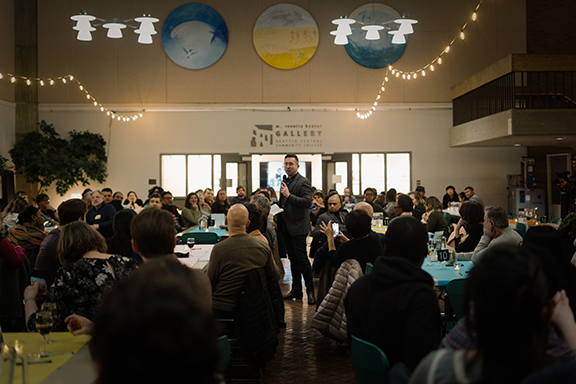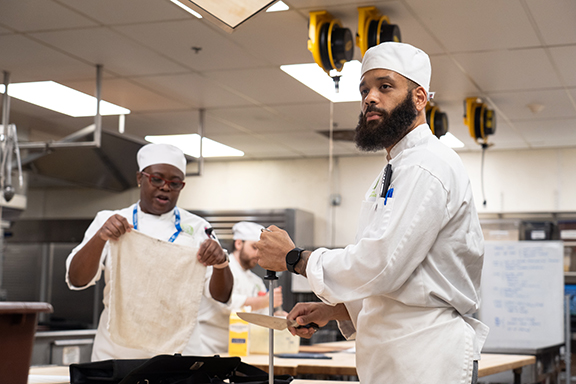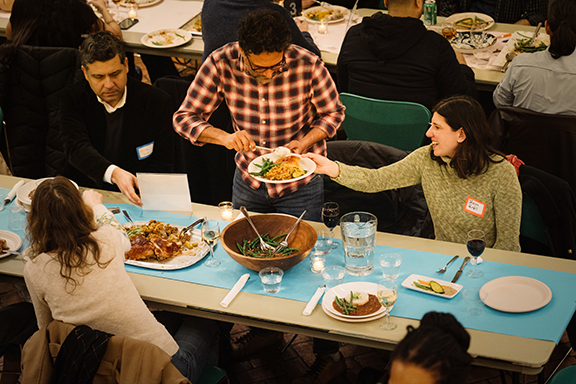Culinary Creations and Community Connections

Seattle Central College — Under the skylight of the Atrium, beneath a canopy of lights, a miscellany of guests filed into long rows of dining tables. Some sat with friends, others with strangers.
Historic photos of the college decorated the wall, and the adjacent M. Rosetta Hunter Art Gallery showcased its new exhibition on Tina Bell, the Queen of Grunge. While the halls were relatively empty of students, they were instead filled with countless new friends and affiliates of the college.
In the kitchen, 17 volunteers from the Seattle Culinary Academy prepared jambalaya, fried pickles, doberge cake. The culinary students had spent the past two days concocting a Cajun/creole-inspired meal in honor of Black History Month. They had set a challenge for themselves that night: provide service to 175 guests in just 30 minutes.
On Friday, February 16, Seattle Central College friends, family, and neighbors gathered for the college’s inaugural Community Dinner, a night of communal dining and friend-making for just $20. This dinner marked the first step in opening the college’s doors to the Capitol Hill community. It is also part of the college’s broader effort to embrace its role as the cornerstone of the neighborhood and to organize accessible community events and activities on campus.
Just hours before the dinner, culinary student Lu Brennan asked Chef Drew Flanders if he could switch to front of house duties for the night.
Brennan had spent the bulk of his prep days working behind the scenes on the jambalaya — and was especially excited to show off the shallot vinaigrette he perfected.
Chef Drew assigned Brennan to the bar, where he charmed neighbors and even poured wine provided by the South Seattle College’s NW Wine Academy to a guest from Detroit. While Brennan kept glasses full, the rest of the culinary students focused on meeting their 30-minute service goal.
The final table received their meal after 28 minutes – and most were served in just 26.
Background
The Community Dinner was inspired by a 2023 visit to Denmark. Interim President Dr. Bradley Lane traveled with the Capitol Hill EcoDistrict, a local non-profit and Seattle Central partner as part of a Masterclass studying how to make neighborhoods more livable.
Part of the intention of the dinner was to announce to folks that there are lots of ways you can engage with us even if you're not taking a class.
President Bradley Lane spent a summer Copenhagen evening at Absalon, a bustling community center where guests come to dance, sing karaoke, and even take pottery classes. The “living room away from home” famously hosts a fællesspisning — or communal dinner — every day of the year.
Lane felt compelled to transpose the same community-oriented spirit of Absalon onto Seattle Central. As life returns to Capitol Hill in the wake of the pandemic, Lane believes the college needs to step up into its role as a community cornerstone.
“Now that we're returning to a much more active campus, we want to be developing a sort of menu of opportunities for community members,” Lane said. “Part of the intention of the dinner was to announce to folks that there are lots of ways you can engage with us even if you're not taking a class.”

Dinner Reactions
Brennan, a former military man who initially enrolled in the Seattle Culinary Academy out of a passion for cooking family-style meals inherited from his Italian side of the family, was surprised and excited by the event. Brennan is also known by culinary staff as the guy who volunteers for anything and everything.
“I was surprised by how many people showed up and by how fast we went through all the alcohol,” reflected Brennan.
Like many other attendees seated at her table, long-time Capitol Hill resident Susan Ragen decided to attend Community Dinner solo.
Despite her familiarity with the neighborhood, Ragen expressed challenges in making connections with new people as she gets older. It was Ragen’s mom who initially forwarded her the email about the dinner, which seemed like the perfect, low-stakes opportunity to counter that trend. “It's good to meet people at any point in your life, right?” she said.
At the dinner, Ragen found herself engaged in meaningful conversations with fellow attendees of various ages and backgrounds. “I've been here almost my whole life, watching Broadway go through different time periods, and it'll continue to change and evolve,” she reflected. "It's helpful to have activities where you can just go, because there are a lot of single people that live on the Hill."
Ragen is beyond excited to attend future Community Dinners. She even expressed interest in enrolling in a class or two.
I just had doberge cake in New Orleans, and it was almost as good at Seattle Central.
Another attendee looking forward to future Community Dinners is Laura Culberg, who runs the Capitol Hill Business Alliance, the neighborhood chamber of commerce.
Culberg, whose partner is from New Orleans, was incredibly impressed by the Culinary School’s work, especially dessert. “I just had doberge cake in New Orleans, and it was almost as good at Seattle Central,” she shared.
She already has plenty of ideas to build upon the success of the Community Dinner. Like President Lane, Culberg is interested in how the college can continue to activate spaces for community engagement initiatives.

Future plans
Lane envisions Community Dinner evolving into a recurring series that people can count on as a space to make new friends, engage with the broader community, and as an alternative to the traditional nightlife Capitol Hill is known for. To realize these plans, Seattle Central is actively looking into grant funding and collaborative efforts with neighborhood groups for sustained support and expansion.
I always worry about throwing a party and having no one come.
The Community Dinner is just one of many ways Lane plans to invest in Seattle Central and its surrounding community.
One long-term goal is the renovation of Broadway Performance Hall, campus’ oldest building and the only remaining part of the original Broadway High School completed in 1902. Other upcoming projects include transforming the Harvard Parking Garage with greenery and art, building on-campus housing for up to 500 students, and the Nagle Place project, which aims to make the college more welcoming to the adjacent Cal Anderson Park community through planting traffic-calming trees that enhance pedestrian safety.
Lane is also working with community organizations and neighborhood partners to brainstorm ways to activate unused or underutilized community spaces through public art.
In the meantime, more Community Dinners are envisioned for the future.
“I always worry about throwing a party and having no one come,” Lane reflected on the dinner’s successful turnout. “This was exactly the kind of crowd we wanted to assemble, particularly the magic of this mix of familiar and new.”